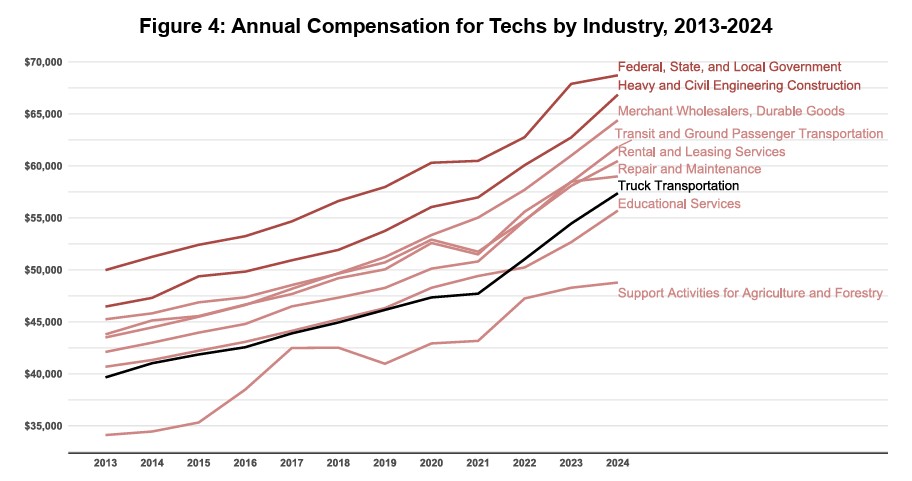Current Landscape of Diesel Technician Employment
In the world of logistics, a pressing concern has emerged: a significant deficit in qualified diesel technicians. Reports reveal that nearly two-thirds of repair shops across the United States are grappling with staffing issues, resulting in an average of 19.3% of diesel tech positions remaining unfilled. This scenario is no small potatoes; it directly impacts the efficiency of the trucking industry.
The Crisis Unpacked
According to a study conducted by the American Transportation Research Institute (ATRI), approximately 65.5% of trucking shops are understaffed, evidencing a worrisome trend in the industry. Data gathered from the Bureau of Labor Statistics (BLS) signifies that the trucking sector employed around 57,300 diesel technicians in 2024—the highest number of any industry. This demand, however, is on the rise. Projections estimate that over the next decade, about 24,800 new hires will be required each year due to retirements and personnel transitioning to different occupations. High turnover and the need for replacements create a daunting landscape for logistics operations.
Retirement and Transition Rates
The need for skilled technicians is compounded by the anticipated retirements, with BLS indicating that approximately 9,700 diesel techs will retire yearly, alongside 15,100 moving on to different fields. This leads to a projected demand for an additional 5,700 new hires each year, just to keep pace with the industry’s growth. When all factors are considered, the total annual hiring requirement for diesel technicians could escalate as high as 30,500 individuals.
Challenges in Training and Retainment
Robert Braswell, the executive director of the Technology & Maintenance Council at the American Trucking Associations (ATA), highlights that a significant number of technicians—61.8%—enter their roles without formal training. This gap necessitates an average of 357 training hours and $8,211 in trainee wages to adequately prepare newcomers. Conversely, those with some formal training still face challenges, with many unable to qualify in critical skill areas. In some cases, each additional hour of training improves qualification by a staggering 16% in vital areas, yet in others, the return on training investment is much lower, indicating an urgent need for curriculum reforms.
Compensation Issues
In the pursuit of attracting and retaining talent, compensation plays a pivotal role. The ATRI report notes that average annual pay for technicians in the trucking sector rose by 39.8% over the last decade, now sitting at around $57,362 in 2024. While this increase positions trucking among the faster-growing industries, it still lags behind others such as independent repair, passenger transit, and rental services, which offer salaries considerably higher—an issue that logistics firms need to address swiftly to combat turnover.
Barriers to Entry for Aspiring Technicians
Many aspiring technicians face hurdles from the get-go. Top barriers reported include the high cost of acquiring tools (29%), insufficient pay (16.1%), and inadequate mentorship (10.8%). Despite the draw of competitive pay and work schedules, many are tempted to explore opportunities in other industries due to dissatisfaction with management interactions and job variety. Furthermore, the transition to less desirable shifts can deter potential talents, leaving a majority dissatisfied and looking elsewhere for work.
Exploring the Alternatives
A considerable 44% of trucking technicians are contemplating career changes, with alternative options including automotive and agriculture industries. The ongoing issues surrounding dissatisfaction in pay and job variety will undoubtedly affect the logistics sector’s ability to maintain a robust workforce.
A Path Forward
With a significant portion of technicians considering alternative job markets, strategies to improve retention and training in logistics are vital. The importance of elevating training programs and incentivizing sustainable growth within the workforce cannot be overstated. Ensuring that technicians feel supported and adequately compensated will benefit the industry, enabling logistics companies to retain their talents and foster a more sustainable future for technical roles.
最终想法
As we navigate these challenges, it becomes clear that every industry has its hurdles—but nothing beats the learning curve that personal experience brings. While insights from various reports can guide decisions, the unique services offered by platforms like GetTransport.com present a game-changing aspect of logistics. With competitive pricing and a global reach, GetTransport.com provides crucial solutions for cargo transportation and logistics needs. This includes everything from office relocations to the movement of bulky items, making it an indispensable partner for businesses needing reliable and efficient transport solutions.
Ultimately, as the industry faces growing staffing shortages and a need for qualified technicians, solutions must adapt to these challenges. The overview of workforce issues within the diesel technician field highlights both the obstacles and opportunities for better training programs and pay scales. Those engaged in logistics and transportation can leverage available resources, such as those at GetTransport.com, to continue pushing the envelope of what is possible in logistics. With transparency and convenience in service, GetTransport.com stands ready to assist. Book your ride with GetTransport.com 以获得最佳优惠!

 Supply Chain and Workforce Issues: The Shortage of Diesel Technicians">
Supply Chain and Workforce Issues: The Shortage of Diesel Technicians">